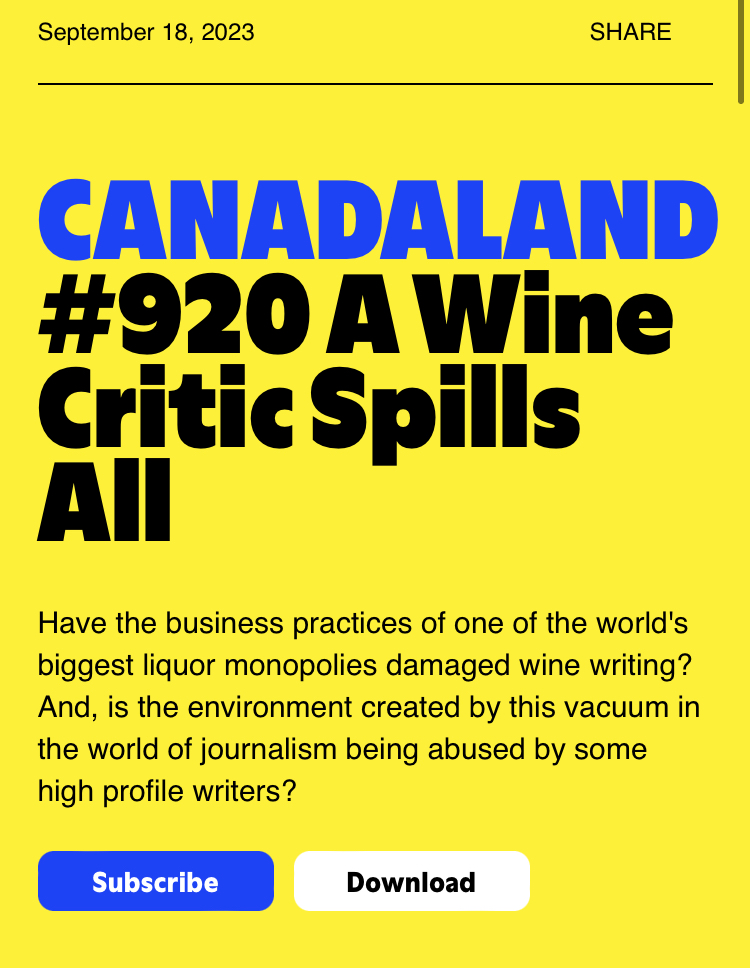Behind the Scenes of Wine Writing in Ontario
In Canadaland’s podcast, A Wine Critic Spills All, host Jesse Brown takes listeners behind the scenes of Ontario’s wine writing and reviewing landscape, asking if the “business practices of one of the world's biggest liquor monopolies damaged wine writing?” For the 36-minute episode, reporter and wine writer André Proulx spoke with the Globe and Mail’s Christopher Waters, Wines in Niagara’s Rick VanSickle, Ben Hardy of Vintage Selector Wines, tech experts Carmi Levy and Dan Spearin, and media lawyer Miro Oballa.
Brown explains that not only does the government regulate alcohol sales in Ontario, but they also control it. He adds that almost every bottle of alcohol sold in the province goes through the Liquor Control Board of Ontario (the LCBO is the provincial crown corporation responsible for the retail and wholesale of alcohol in Ontario), which is the largest purchaser of alcohol in the world.
On Brown’s own wine buying decision-making process, he says he goes in knowing his price point and if he wants a red or a white, and then leaves the rest up to the wine score provided by the wine critic. But in wanting to know more about the process of wine ratings, Canadaland gets an “insider's account of how the government liquor barons have stained the independents of the wine press.”

André Proulx, wine writer and co-host of Tasting Together, starts off by sharing his wine reviewing and writing experiences, explaining that his readers may think the wines he recommends are “the best bottles anyone can buy, but they're not,” they're just the best bottles he's been sent free samples of, adding “that's just how it works.”
Proulx explains the economics of wine reviewing as he understands it: he gets paid between $250-$300 to write a wine review feature (he doesn’t get reimbursed for wine he would purchase for a review), while the LCBO releases 100+ new products every two weeks, with only a few sent to him for review. So Proulx gets paid a few hundred bucks, while a winery may benefit from significantly higher sales from a positive review, a disparity that he says “is ripe for abuse.”
Proulx explains that it didn’t used to be this way. Until 2019, wine journalists could go to the LCBO to try all the new wine releases, but then they started limiting the options, eventually getting rid of the journalist tasting altogether. He goes on to explain that wine sellers or agencies can’t get a wine on LCBO shelves without submitting a review/rating from a wine critic. Proulx has also seen this in his role as a winemaker — he is the co-founder of the 80x wine Company, who makes small batch VQA Rosé, Chardonnay, and Pinot Noir.

Proulx asked the LCBO about this and received a written response:
The suspension of tastings during COVID allowed us an opportunity to evaluate the media tasting program and to explore other avenues to connect with wine writers. While we are not resuming the media tasting program, we encourage writers to reach out directly to the producers and agents.
Proulx says it feels like the LCBO “has kind of turned its back on us old school wine critics in favor of influencers and other social media voices who are less likely to be critical.”
He goes on to talk to Christopher Waters about what it was like to try to sell ads to wine companies for the magazine Waters co-founded and edited, VINES, when the competition was the biggest wine store in the province, who had their own magazine, Food & Drink.
He also talks about Carolyn Evans Hammond, wine columnist for The Toronto Star, who in 2019 wrote This red wine under $8 is so good it will clear off LCBO shelves, and it did fly off the shelves, but not necessarily because it’s a good wine — scoring a $7.95 (now $9.95) wine with 96 points is just the sort of thing that makes one wonder about the state of wine ratings. Evans Hammond also has a YouTube channel where she shares wines she likes, and also wines from agencies that sponsor her videos. Proulx notes some red flags about the channel’s algorithm, and also says that 40% of the wines featured in the Toronto Star columns are from agencies that sponsor her channel.
The full podcast is eye-opening and insightful, and if you have 36 minutes to spare, you should give it a listen. But the key takeaway comes at the end when Proulx says:
There's just so much money at stake when it comes to guiding the consumers tastes. This system practically ensures that influencers and sponsored content will dominate over people like me, who want to help people know what's really worth their money and what isn't. What's even more challenging is that these very loose rules have now blurred the line between what is journalism and what is paid content.



